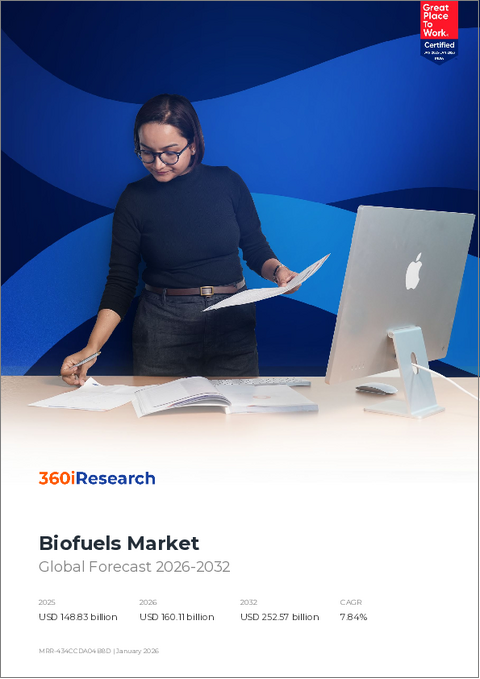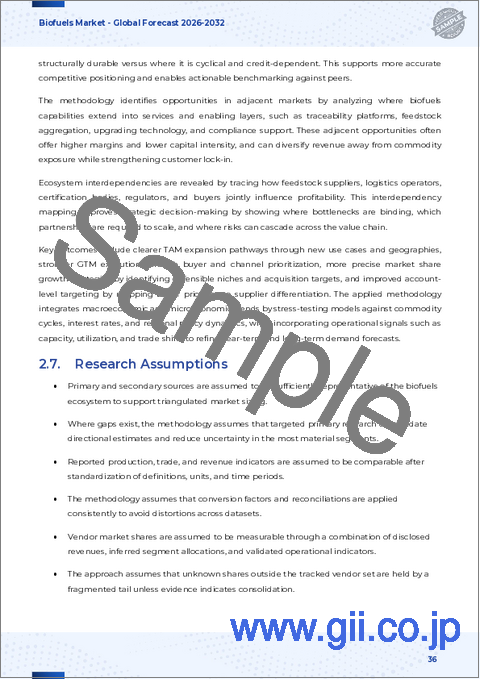|
|
市場調査レポート
商品コード
1827357
バイオ燃料市場:バイオ燃料タイプ、製造プロセス、形態、原料タイプ、最終用途、流通チャネル別 - 2025年~2032年の世界予測Biofuels Market by Biofuel Type, Production Process, Form, Feedstock Type, Application, End-Use, Distribution Channel - Global Forecast 2025-2032 |
||||||
カスタマイズ可能
適宜更新あり
|
|||||||
| バイオ燃料市場:バイオ燃料タイプ、製造プロセス、形態、原料タイプ、最終用途、流通チャネル別 - 2025年~2032年の世界予測 |
|
出版日: 2025年09月30日
発行: 360iResearch
ページ情報: 英文 187 Pages
納期: 即日から翌営業日
|
概要
バイオ燃料市場は、2032年までにCAGR 7.93%で3,469億3,000万米ドルの成長が予測されています。
| 主な市場の統計 | |
|---|---|
| 基準年2024 | 1,884億米ドル |
| 推定年2025 | 2,023億2,000万米ドル |
| 予測年2032 | 3,469億3,000万米ドル |
| CAGR(%) | 7.93% |
バイオ燃料業界を持続可能な低炭素エネルギー・ソリューションの新時代へと押し上げる市場促進要因と基礎的背景を解明
世界の利害関係者が持続可能なエネルギーをますます優先するようになり、バイオ燃料セクターは目覚しい変貌を遂げています。歴史的には、バイオ燃料は化石燃料に代わるクリーンな燃料として登場し、植物や有機廃棄物を利用してエタノールやバイオディーゼル、そして新たな燃料を生産してきました。やがて、政府の奨励策、環境規制、脱炭素化への取り組みが、バイオ燃料インフラへの大規模な投資を促し、農業、バイオテクノロジー、エネルギー市場の融合にある産業を形成してきました。
現在の情勢では、気候変動緩和の目標とエネルギー安全保障の懸念が絡み合い、バイオ燃料への注目度が高まっています。消費者も企業も、既存のエンジンや工業プロセスにシームレスに統合できる低炭素代替燃料を求めています。この需要は、発酵、ガス化、高度な変換方法における技術の進歩に拍車をかけています。さらに、原料の多様化への取り組みが原料基盤を拡大し、農村部の経済開発を促進すると同時に、商品価格の変動に対する回復力を高めています。
2025年以降、バイオ燃料産業は、技術革新、規制の進化、市場力学の変化により定義される新たな成長軌道の頂点に立ちます。以下では、バイオ燃料産業の将来を形作る重要な変化、関税への影響、セグメンテーションに関する洞察、戦略的考察について述べています。
世界のバイオ燃料産業を形成する主要な技術、規制、市場の変化を探り、将来の回復力と成長につなげる
世界のバイオ燃料業界は、技術革新と規制状況の進展により、大きく変化しています。高度な発酵経路や触媒変換といった最先端のプロセスにより、バイオ水素やバイオブタノールのような次世代燃料の生産が、効率の向上とカーボンフットプリントの削減を伴って可能になりつつあります。同時に、プロセス最適化のためのデジタルツールは、歩留まりの予測可能性とオペレーションの拡張性を高め、より機敏な生産エコシステムを構築しています。
温室効果ガス削減目標の厳格化により、混合義務や持続可能性基準の引き上げが促されるなど、規制の枠組みも連動して進化しています。このような規制強化は、従来のプロセスの廃止を加速させ、生産者にグリーンケミストリーの原則と循環型経済モデルを採用するインセンティブを与えています。さらに、主要な管轄区域におけるカーボンプライシングメカニズムの拡大は、投資の流れを再構築し、利害関係者に長期的なプロジェクト経済性と資産ポートフォリオの再評価を促しています。
エネルギーメジャー、農業関連企業、バイオテクノロジー企業間の提携が勢いを増すにつれ、市場力学も変化しています。共同事業は、非食糧バイオマスや農業残渣を含む新規原料の流れを解き放ち、リスク共有モデルは新興プレーヤーの参入障壁を引き下げています。その結果、この業界は、輸送、発電、産業用熱の各用途で急増する需要を満たすことができる、より統合された弾力性のあるサプライ・チェーンへと移行しつつあります。
2025年米国関税がバイオ燃料セクターの生産コスト、サプライチェーン、競合力学に及ぼす包括的影響の分析
米国による2025年の新たな関税賦課は、世界のバイオ燃料バリューチェーンに大きな複雑性をもたらしました。国内生産者の保護を目的としたこの措置は、輸入原料や中間バイオ燃料製品のコスト上昇を直ちに招いた。関税の引き上げに伴い、輸入元は調達戦略の見直しを余儀なくされ、貿易障壁の影響を受けにくい地域の代替サプライヤーに調達をシフトせざるを得なくなりました。
輸入関税の上昇に対応するため、大手生産者は国境を越えた不安定な貿易状況をヘッジしようと、現地生産施設への投資を加速させています。この戦略的軸足は、陸上転換プラントや、貯蔵・混合ターミナルなどの付帯インフラの拡大を促進しています。一方、川下のアグリゲーターは、国内および地域のパートナーと長期調達契約を結ぶことで供給リスクを軽減し、供給の安全性と操業の継続性を高めています。
今後も、関税環境は競合のポジショニングを形成する極めて重要な要因であり続けると思われます。多様な原料ポートフォリオと柔軟なロジスティクス・ネットワークを持つ企業は、コスト圧力を乗り切り、利幅を維持するための最良の能力を持つと思われます。さらに、関税が長期的な資本配分の決定やバイオ燃料貿易のグローバル・バランスにどの程度影響を及ぼすかを見極めるには、通商政策立案者と業界利害関係者との継続的な対話が不可欠となります。
バイオ燃料のタイプ、製造プロセス、製品形態、原料、用途から重要な市場セグメントを特定し、成長経路を明らかにします
バイオ燃料の状況を、製品の流れと加工経路というレンズを通して考察すると、微妙な図式が浮かび上がってきます。エタノールは、再生可能な輸送用燃料として引き続き主流であるが、バイオディーゼルやバイオブタノール技術の成熟により、産業用燃料や輸送用燃料として重要なニッチが生まれつつあります。バイオガスは、系統連系や発電に利用され、バイオ水素はパイロット・スケールの導入が始まっています。同時に、発酵、ガス化、熱分解、トランスエステル化の各プロセスが進歩し、バイオマス転換の可能性が広がっています。
バイオ燃料の物理的形態(気体、液体、固体)は、最終用途とインフラ要件を決定する上で極めて重要な役割を果たします。気体バイオ燃料は、ユーティリティ・スケールの発電事業や分散型エネルギー・システムで足場を固めているが、液体バイオ燃料は、従来の自動車フリートや産業用バーナーで依然として主流です。固形バイオ燃料は、圧縮農業残渣やペレット化バイオマスを原料とすることが多く、住宅や地域暖房用のコスト効率の高い選択肢として台頭してきています。このような形態特有の特性は、生産手法を流通ネットワークや最終市場のニーズと整合させ、価値を最適化することの重要性を際立たせています。
原料の選択と最終用途のシナリオは、戦略的差別化のもう一つのレイヤーを定義します。粗粒穀物や砂糖作物は長い間、エタノール用の信頼できる原料ベースを提供してきたが、植物油や獣脂はトランスエステル化を通じてバイオディーゼルに供給されます。一方、植物油や獣脂は、トランスエステル化によってバイオディーゼルに変換されます。ジャトロファや加圧調理された鶏糞のような新しい原料は、高度なバイオ燃料の収量について評価されており、糖蜜や選択的白色油脂のような製品別は、統合バイオリファイナリーモデルを支えています。輸送から発電、住宅暖房に至る幅広い用途において、生産者は、コスト力学、持続可能性基準、およびロジスティクスの考慮事項のバランスを取るために、原料ミックスを継続的に調整する必要があります。
アメリカ、欧州、中東・アフリカ、アジア太平洋地域における、バイオ燃料の世界的普及を促進する戦略的機会と課題のマッピング
南北アメリカでは、北米市場が、連邦政府の再生可能燃料基準や州レベルの低炭素燃料義務に支えられ、力強い成長を遂げています。米国では、税制優遇措置と研究開発資金に支えられ、従来型のエタノール・バイオリファイナリーと先進バイオディーゼルコンプレックスの両方が大幅に拡大しています。一方、ブラジルの長年にわたるエタノール・プログラムは、統合されたサトウキビのサプライ・チェーンとフレックス燃料車の普及から恩恵を受け続けており、再生可能な輸送用燃料におけるブラジルのリーダーシップを強化しています。カナダの取り組みも同様に、州のリベート制度やカーボンプライシングメカニズムを通じて、バイオガスやバイオヒートプロジェクトを促進しています。
欧州、中東・アフリカでは、厳しい排出削減目標が、野心的なバイオ燃料混合政策と持続可能性認証の枠組みを推進しています。欧州連合(EU)の再生可能エネルギー指令(Renewable Energy Directive)の改正により、ドロップイン・バイオ燃料の需要が高まっており、事業者は廃棄物由来の原料の選択肢を模索しています。中東では、豊富な農業残渣を活用したバイオベースの発電や輸送用燃料プロジェクトを通じて、エネルギー・マトリックスの多様化を目指す新たな取り組みが始まっています。アフリカ市場は初期の成長段階にあり、パイロット・プログラムによって農村部の電化や小規模暖房用途でのバイオ燃料の可能性が実証されています。
アジア太平洋地域は、インドのサトウキビ地帯で確立されたエタノール利用から、東南アジアのパーム油生産国で急成長しているバイオディーゼル義務化まで、多様な市場成熟度を示しています。中国のバイオガスインフラへの戦略的投資は循環型経済へのシフトを強調するものであり、日本は産業の脱炭素化のためにバイオ水素の研究を進めています。オーストラリアは、原料ロジスティックスと地域輸出回廊に重点を置き、持続可能な液体バイオ燃料の新たな供給国として位置づけられています。地域全体では、政策の調和と国境を越えた協力が、規模の拡大に不可欠です。
バイオ燃料エコシステムにおける技術進歩、戦略的提携、市場拡大を推進する主要イノベーターと主要競合企業のプロファイリング
大手バイオ燃料メーカーは、技術統合、戦略的提携、垂直統合を通じて、提供する製品の差別化を図っています。エネルギーと農業関連事業の世界的リーダーは、バイオテクノロジー企業と提携し、酵素と触媒の開発を加速し、変換効率を高めています。大手製油所数社は、再生可能原料に対応するために既存の製油所資産を改修しており、操業の回復力を強化するデュアル原料への柔軟性という動向を示しています。
同時に、純粋なバイオリファイナリー事業者は、従来の穀物、廃油、次世代バイオマスにまたがる多様な原料パイプラインを活用し、合弁事業やグリーンフィールド・プロジェクトを通じて生産能力を拡大しています。これらの企業は、プロセス・パラメーターを最適化し、ダウンタイムを削減するために、高度なデータ分析とデジタル・ツインを導入しています。これと並行して、中堅市場に特化したイノベーターの新潮流が、航空用バイオジェットや船舶用燃料のような高価値の特殊バイオ燃料に注力し、自らを難燃セクターの重要なイネーブラーとして位置付けています。
競合情勢は、スケールメリットの追求と地域情勢別参入の拡大による統合やM&Aによってさらに形成されています。原料供給会社、輸送会社、技術ベンダー間の提携は、バリューチェーン統合への全体的なアプローチを反映して、一般的になりつつあります。最終的には、研究開発、原料調達、流通物流をシームレスに連携させることができる企業が、複雑化する市場環境において競争力を確保することになります。
業界リーダーが新たな動向を活用し、オペレーションを最適化し、市場競争力を強化するための戦略的かつ実行可能な提言を提供
進化するバイオ燃料エコシステムの複雑さを乗り切るために、業界のリーダーは、原料の入手可能性や規制要件の変化に迅速に対応できる、モジュール化されたスケーラブルな生産技術への投資を優先すべきです。ガス化結合発酵や触媒熱分解のような高度な変換経路を採用することで、環境フットプリントを最小限に抑えながら、より価値の高い燃料ストリームを得ることができます。さらに、デジタルモニタリングシステムと予測分析を統合することで、操業の俊敏性を高め、データ主導の意思決定をサポートすることができます。
バリューチェーン全体での戦略的協力も不可欠です。エンドユーザーと長期引取契約を結び、農業利害関係者とパートナーシップを結ぶことで、原料供給を確保し、持続可能な調達を促進することができます。政策立案者と積極的に関わり、現実的な規制の枠組みを形成することで、混合燃料の義務化と炭素価格決定メカニズムが、環境的な野心と経済的な実行可能性のバランスを取ることができます。さらに、既存の製油所や発電資産との併設戦略を模索することで、資本利用を最適化し、プロジェクトのスケジュールを早めることができます。
最後に、強固な持続可能性とトレーサビリティのプロトコルを導入することで、透明性とコンプライアンスに対する利害関係者の要求の高まりに対応することができます。ブロックチェーンベースの追跡システムと第三者認証基準を採用することで、企業はバイオ燃料の環境保全性を検証し、ブランドの信頼性を高めることができます。こうした対策は、風評リスクを軽減するだけでなく、検証された低炭素ソリューションを好むプレミアム市場セグメントへの扉を開くことにもなります。
包括的バイオ燃料市場評価を支える厳密な調査手法、データ収集手法、分析フレームワークの詳細
本分析は、業界出版物、規制当局への届出、科学雑誌、企業情報開示などを活用した包括的な2次調査から始まる、多段階の調査手法に基づいています。この初期調査により、現在のバイオ燃料市場を形成している歴史的動向、技術的進歩、政策の転換に関する基本的な理解が得られました。
その後の1次調査では、技術提供者、原料供給者、施設運営者、エンドユーザーを含む利害関係者との構造的インタビューを行いました。これらのインタビューは、二次データの検証を容易にし、事業運営上の課題、投資基準、新たなビジネスモデルに関する微妙な洞察を提供しました。すべての質的インプットは、一貫性と正確性を確保するために、量的データセットと相互参照されました。
最終段階では、厳密なデータの三角測量と分析モデリングが行われ、シナリオ分析と比較ベンチマーキングが採用されました。サプライチェーンマッピング、規制影響評価、バリューチェーン最適化などの調査手法が、実用的な洞察を導き出すために用いられました。プロセス全体を通じて、厳格な品質管理プロトコルとピアレビューが適用され、方法論の完全性が維持され、堅固な市場評価が提供されました。
バイオ燃料の変革の可能性を浮き彫りにし、再生可能エネルギー情勢における利害関係者の戦略的重要性を強化する、中核的知見の統合
サマリー:バイオ燃料業界は、急速な技術革新、ダイナミックな政策状況、消費者の嗜好の進化によって形成された、極めて重要な岐路に立たされています。原料の多様化と変換プロセスの進歩により、持続可能な燃料生産への新たな道が開かれつつある一方、貿易環境や関税構造の変化により、機敏な戦略的対応が求められています。
地域市場が成熟し、協力的なエコシステムが深化するにつれ、利害関係者は規制の更新や新たな提携の機会に常に注意を払わなければならないです。生産の俊敏性と厳格な持続可能性基準を相乗させることができる企業は、環境への影響と経済的価値の両方を推進する上で有利な立場にあります。デジタル化、脱炭素化、循環型経済原則の融合は、世界のエネルギー・パラダイムを再定義するまたとない機会を提示しています。
結局のところ、この複雑なエコシステムを成功させるには、技術的な先見性、利害関係者の関与、データ主導の戦略を統合した総合的なアプローチが必要となります。バイオ燃料業界関係者は、これらの必須条件を受け入れることで、バイオ燃料の変革の可能性を活用し、低炭素の未来に有意義に貢献することができます。
目次
第1章 序文
第2章 調査手法
第3章 エグゼクティブサマリー
第4章 市場の概要
第5章 市場洞察
- 世界の航空会社の脱炭素化の取り組みにより、持続可能な航空燃料の需要が高まっている
- 農林業廃棄物を原料とした第2世代バイオ燃料の拡大
- 政府の義務とブレンディング目標により、運輸部門におけるバイオ燃料の導入が加速
- 高収量・低炭素生産のための藻類バイオ燃料技術への投資増加
- 既存の車両およびエンジンインフラストラクチャと互換性のあるドロップインバイオ燃料の好感度が高まっています
- 生産能力の拡大に向けた石油会社とバイオ燃料スタートアップ企業との戦略的提携
- 統合された炭素回収・貯留プロセスによるカーボンネガティブバイオ燃料の出現
- リグノセルロース系バイオマスの酵素変換効率を向上させる技術の進歩
- 変動する作物価格が第一世代バイオ燃料の生産コストと供給安定性に影響を与える
- 分散型バイオ燃料生産モデルが農村部やオフグリッドエネルギー市場で普及しつつある
第6章 米国の関税の累積的な影響, 2025
第7章 AIの累積的影響, 2025
第8章 バイオ燃料市場:バイオ燃料タイプ別
- バイオブタノール
- バイオディーゼル
- バイオエタノール
- バイオガス
第9章 バイオ燃料市場:製造プロセス別
- 生化学的変換
- 嫌気性消化
- 酵素加水分解
- 発酵
- 熱化学変換
- フィッシャー・トロプシュ合成
- ガス化
- 熱分解
- エステル交換反応
第10章 バイオ燃料市場:形態別
- 気体
- 液体
- 固体
第11章 バイオ燃料市場:原料タイプ別
- 第一世代のバイオ燃料
- トウモロコシ
- サトウキビ
- 小麦
- 第四世代バイオ燃料
- 第二世代バイオ燃料
- 農業残渣
- エネルギー専用作物
- リグノセルロースバイオマス
- 第三世代バイオ燃料
- 藻類
- シアノバクテリア
第12章 バイオ燃料市場:用途別
- 暖房および産業用途
- 発電
- 輸送燃料
第13章 バイオ燃料市場:最終用途別
- 自動車
- 航空
- エネルギーと電力
- 海洋
第14章 バイオ燃料市場:流通チャネル別
- オフライン
- オンライン
第15章 バイオ燃料市場:地域別
- 南北アメリカ
- 北米
- ラテンアメリカ
- 欧州・中東・アフリカ
- 欧州
- 中東
- アフリカ
- アジア太平洋地域
第16章 バイオ燃料市場:グループ別
- ASEAN
- GCC
- EU
- BRICS
- G7
- NATO
第17章 バイオ燃料市場:国別
- 米国
- カナダ
- メキシコ
- ブラジル
- 英国
- ドイツ
- フランス
- ロシア
- イタリア
- スペイン
- 中国
- インド
- 日本
- オーストラリア
- 韓国
第18章 競合情勢
- 市場シェア分析, 2024
- FPNVポジショニングマトリックス, 2024
- 競合分析
- Gevo, Inc.
- Archer-Daniels-Midland Company
- Aemetis, Inc.
- Air Liquide S.A.
- Alto Ingredients, Inc.
- Bangchak Corporation Public Company Limited
- Borregaard AS
- BP PLC
- Cargill, Incorporated
- Chevron Corporation
- Cosan
- DuPont de Nemours, Inc.
- Enerkem Inc.
- Exxon Mobil Corporation
- FutureFuel Corp.
- Green Plains Inc.
- Indian Oil Corporation Limited
- Koninklijke DSM N.V.
- Montauk Renewables, Inc.
- Munzer Bioindustrie GmbH
- POET, LLC
- Praj Industries Limited
- REX American Resources Corp.
- Scandinavian Biogas Fuels International AB
- Shell PLC
- Shree Renuka Sugars Ltd.
- Siemens AG
- Sunoil Biodiesel Emmen
- Swedish Biofuels AB
- Tidewater Renewables Ltd.
- TotalEnergies SE
- Valero Energy Corporation
- Verbio SE
- Verde Clean Fuels, Inc.
- Woodland Biofuels Inc.






